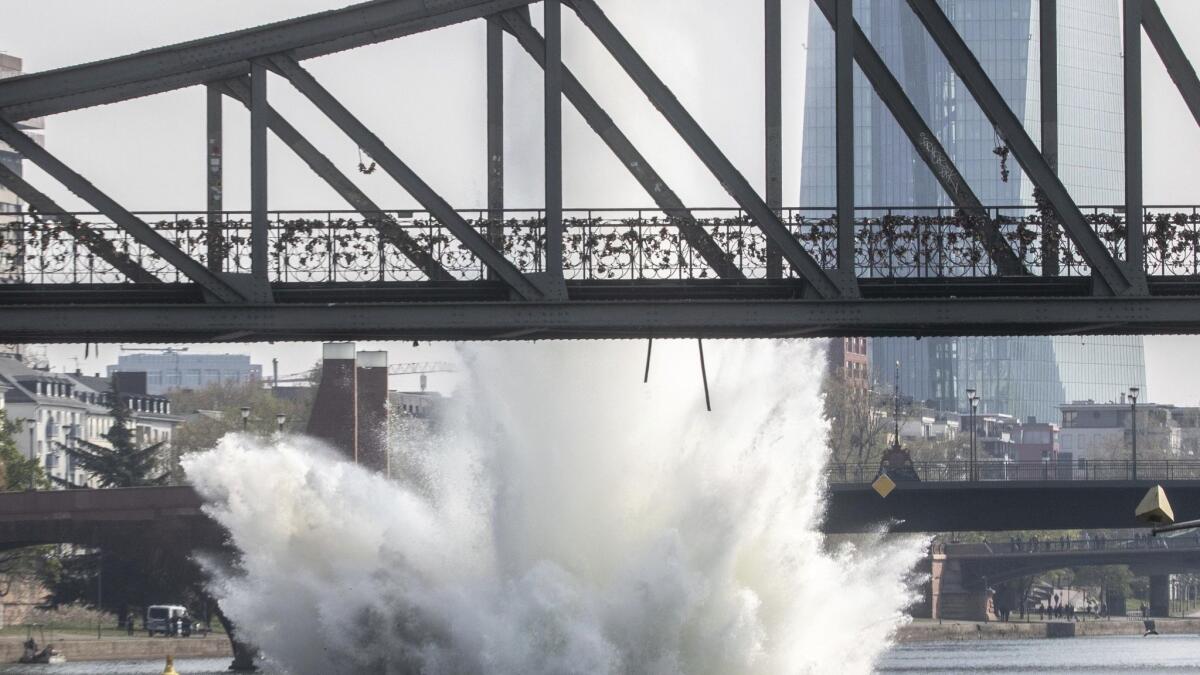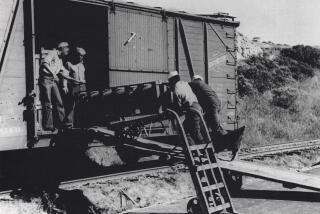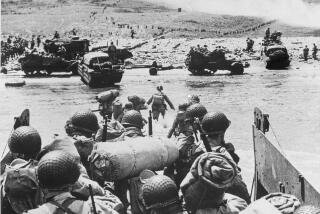A 500-pound bomb is detonated in Germany — more than seven decades later

A 500-pound bomb dropped by a U.S. warplane during World War II finally exploded in the Main River in the heart of Frankfurt on Sunday when a police munitions disposal crew tried to blow up its decaying detonator but instead set off the device.
The controlled explosion of the bomb, which police had determined was too volatile to be transported to shore to be defused, sent a gush of water shooting 70 feet high even though the weapon was detonated at a depth of about 20 feet below the surface of the river that runs through the center of Germany’s financial capital.
The larger than expected blast could be heard miles away and residents reported feeling the ground vibrating. Thousands of deadly World War II devices are still discovered and quietly defused by police bomb experts each year but this was one of the most spectacular explosions in recent memory of the ordnance that has been lurking below the surface for more than seven decades.
“That was really great,” said Dieter Schwetzler, the head of the police operation, in an interview with the local HR TV station in Frankfurt. “Yes, I have to admit I was surprised the plume of water went so high. We’ve had similar underwater detonations before but nothing as high as this one. It was quite incredible.”
Police munitions expert Tobias Fochler, who tried to inspect the bomb’s remnants to ensure that there were no dangerous parts remaining, told HR TV that it had left a crater measuring 30 feet wide and 5 feet deep.
“There’s nothing left,” he said.
The rusting bomb was discovered in the riverbed on Tuesday by a group of firefighters taking part in a routine underwater training exercise.
Discoveries of World War II bombs are not uncommon because an estimated 15% of the bombs dropped by American and British warplanes failed to explode. About 2,000 tons of bombs and live munitions are found buried in the soil in Germany every year, a ghoulish reminder of the war that now rarely makes news.
Most of the explosive devices that are often found at construction sites are defused by the police forces, like a 4,000-pound “blockbuster” bomb dropped by Britain’s Royal Air Force on Frankfurt and defused in 2017 after 65,000 people were evacuated for most of the day.
Bombs discovered submerged in waterways and then detonated underwater are rare. The busy waterway, a tributary of the Rhine River, was briefly closed for shipping as experts inspected the condition of the bomb.
Schwetzler said police had originally planned to try to defuse the bomb early on the bright sunny Sunday morning after evacuating about 600 nearby residents.
“But the detonator was badly encrusted,” he said. “That’s why we decided we would have to set it off.”
The authorities carefully towed the bomb to a deeper section in the middle of the river. After setting off a series of smaller explosions to scare away fish from the region, the team detonated the World War II bomb about 11:30 a.m.
Frankfurt, in the western part of Germany, was one of the most heavily bombed cities during the war. There were 75 Allied air raids between 1940 and 1945 with some 26,000 tons of munitions dropped on the city. More than 5,500 people were killed and about half of the buildings in the city were destroyed.
In a city littered with World War II-era explosives, Berlin’s bomb squad is always on alert »
More to Read
Sign up for Essential California
The most important California stories and recommendations in your inbox every morning.
You may occasionally receive promotional content from the Los Angeles Times.









